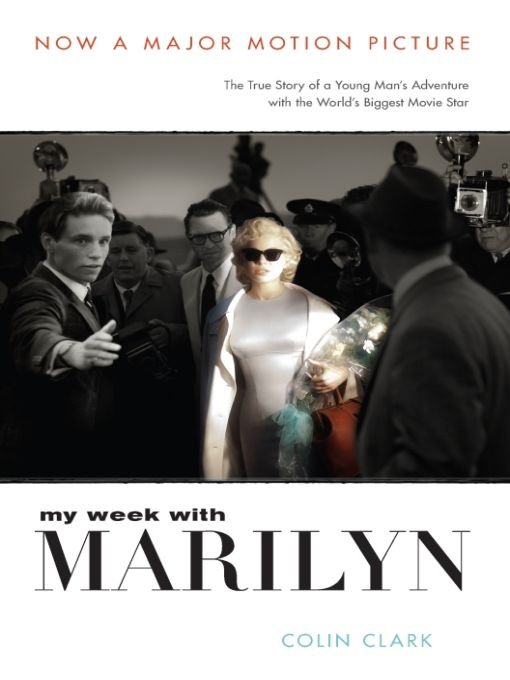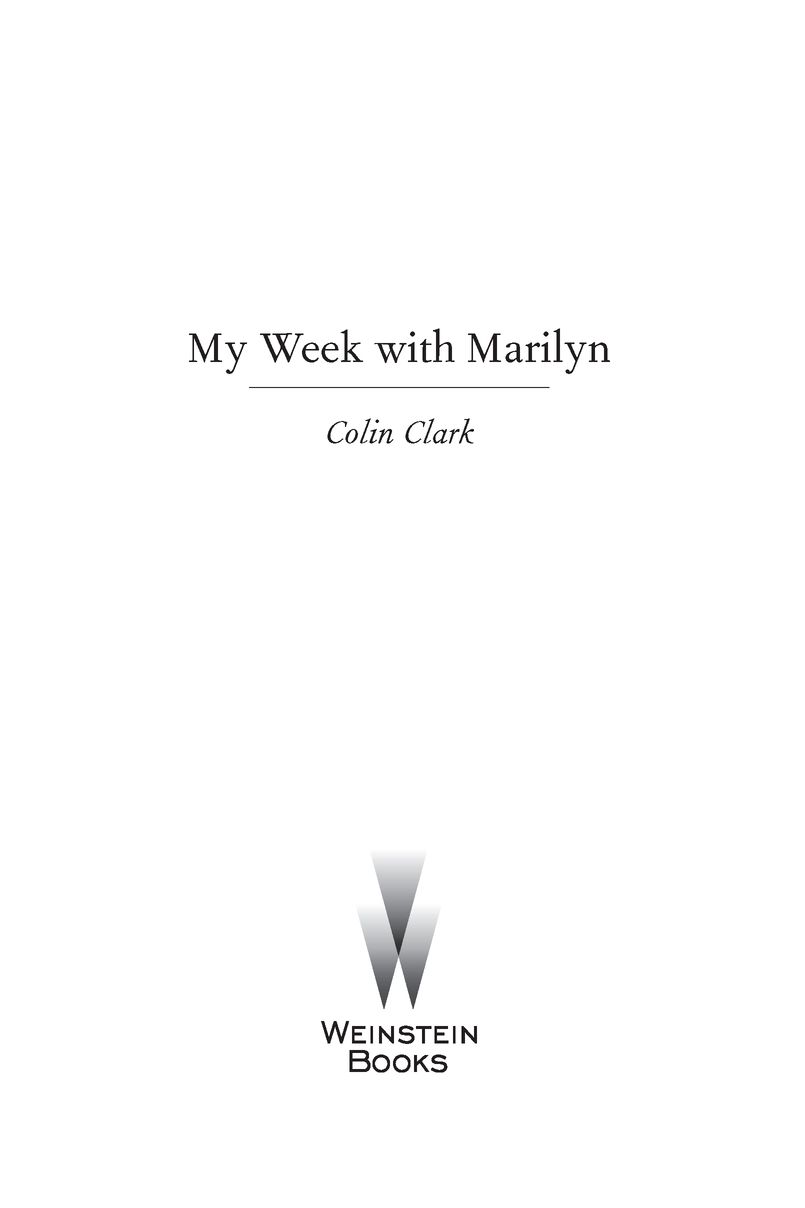My Week with Marilyn
Read My Week with Marilyn Online
Authors: Colin Clark


Table of Contents
Â
Â
Â
Â
PUBLISHER'S NOTE
In 1956, fresh out of Oxford, twenty-three-year-old Colin Clark was employed as a “gofer” on the English set of
The Prince and the Showgirl,
a film featuring Sir Laurence Olivier, Britain's preeminent classical actor, and Marilyn Monroe, Hollywood's greatest star. From the outset the production was bedeviled by problems, and the clashes between Monroe and Olivier have since entered film legend. As a lowly set assistant Clark kept a fly-on-the-wall record of the often tumultuous experience in a journal he published to great acclaim almost forty years later, in 1995, as
The Prince, the Showgirl, and Me.
The Prince and the Showgirl,
a film featuring Sir Laurence Olivier, Britain's preeminent classical actor, and Marilyn Monroe, Hollywood's greatest star. From the outset the production was bedeviled by problems, and the clashes between Monroe and Olivier have since entered film legend. As a lowly set assistant Clark kept a fly-on-the-wall record of the often tumultuous experience in a journal he published to great acclaim almost forty years later, in 1995, as
The Prince, the Showgirl, and Me.
But one week was missing from the middle of that book. For nine days during the filming, Clark found himself escorting an unhappy Monroe around England in an innocent and often idyllic adventure designed to help the actress escape the pressures of working with Olivier and an often hostile cast and crew. In the process Clark earned Monroe's lasting trust and affection. From the notes Clark made shortly after the episode he wrote
My Week with Marilyn,
published in 2000, two years before his death.
My Week with Marilyn,
published in 2000, two years before his death.
Here, for the first time,
My Week with Marilyn
and
The Prince, the Showgirl, and Me
are published together in the same volume.
My Week with Marilyn
and
The Prince, the Showgirl, and Me
are published together in the same volume.
My Week with Marilyn
For Christopher
INTRODUCTION
All my life I have kept diaries, but this is not one of them. This is a fairy story, an interlude, an episode outside time and space which nevertheless was real. And why not? I believe in magic. My life and most people's lives are a series of little miracles â strange coincidences which spring from uncontrollable impulses and give rise to incomprehensible dreams. We spend a lot of time pretending that we are normal, but underneath the surface each one of us knows that he or she is unique.
This book sets out to describe a miracle â a few days in my life when a dream came true and my only talent was not to close my eyes. Of course I didn't realise quite what a miracle it was at the time. I had been brought up in a world of âmake believe'. My earliest memory of my parents is of remote and wonderful beings, only seen late at night, wearing full evening dress. All their friends seemed to be exotic too. Actors, artists, ballerinas and opera singers filled our house with a wonderful feeling of excitement and unreality.
And there was my older brother, Alan. Alan's imagination knew no bounds, even then. My twin sister and I were completely under his spell, and he led us into a succession of fantastical adventures and games. It was hardly surprising that by the age of twelve I had decided that âshow business' would one day be the life for me; and so it has been ever since.
I got my first job in the summer of 1956, at the age of twenty-three, working on a film called
The Sleeping Prince,
starring Laurence
Olivier and Marilyn Monroe. I had just come down from university, and I had no experience whatever. I was only employed because my parents were friends of Olivier and his wife, Vivien Leigh. The Oliviers had been frequent visitors to our home, Saltwood Castle in Kent, and they had become part of my extended family.
The Sleeping Prince,
starring Laurence
Olivier and Marilyn Monroe. I had just come down from university, and I had no experience whatever. I was only employed because my parents were friends of Olivier and his wife, Vivien Leigh. The Oliviers had been frequent visitors to our home, Saltwood Castle in Kent, and they had become part of my extended family.
The news that Olivier, the best-known classical actor of his generation, was going to make a film with Marilyn Monroe, the famous Hollywood film star, caused a sensation. Marilyn was to play the part which had been taken by Vivien herself in the play by Terence Rattigan on which the film was based. Up to then she had only played strippers and chorus girls, in very limited roles. In 1955, after a terrific struggle, she renegotiated her contract with Twentieth Century-Fox and announced her intention to do more serious work. Typecasting is never easy to escape, especially in films. Her first new role had been that of a stripper (in
Bus Stop
), and the second, chosen for her by Milton Greene, her partner in the newly formed Marilyn Monroe Productions, was that of a chorus girl. The only âserious' element was that both films were by so-called âserious' writers.
Bus Stop
had been based on a play by William Inge, and
The Sleeping Prince
on a play by Terence Rattigan.
Bus Stop
), and the second, chosen for her by Milton Greene, her partner in the newly formed Marilyn Monroe Productions, was that of a chorus girl. The only âserious' element was that both films were by so-called âserious' writers.
Bus Stop
had been based on a play by William Inge, and
The Sleeping Prince
on a play by Terence Rattigan.
Filming
The Prince and the Showgirl,
as it was finally called (it was decided that the title should include a reference to Marilyn's character), went badly from the very beginning. Olivier patronised Monroe and treated her like a dumb blonde. This was exactly what she was trying to escape, and she resented it intensely. It also drastically affected her self-confidence, and as a result she constantly relied for advice on her âdramatic coach', Paula Strasberg, whom Olivier distrusted. Paula's husband Lee Strasberg, the head of the Actors Studio in New York, was trying to control Monroe from across the Atlantic. At the same time he was extracting a huge salary for his wife, which made him very unpopular. Monroe's new husband, the playwright Arthur Miller, was treating her like a difficult child, and this also undermined her. Milton Greene was desperate to retain control of âhis' star, and was letting her take more prescription
drugs than was perhaps wise. But Monroe was determined to show that she could act, despite her feelings of inadequacy when faced with Olivier and the super-professional English team that had been assembled specially for the film.
The Prince and the Showgirl,
as it was finally called (it was decided that the title should include a reference to Marilyn's character), went badly from the very beginning. Olivier patronised Monroe and treated her like a dumb blonde. This was exactly what she was trying to escape, and she resented it intensely. It also drastically affected her self-confidence, and as a result she constantly relied for advice on her âdramatic coach', Paula Strasberg, whom Olivier distrusted. Paula's husband Lee Strasberg, the head of the Actors Studio in New York, was trying to control Monroe from across the Atlantic. At the same time he was extracting a huge salary for his wife, which made him very unpopular. Monroe's new husband, the playwright Arthur Miller, was treating her like a difficult child, and this also undermined her. Milton Greene was desperate to retain control of âhis' star, and was letting her take more prescription
drugs than was perhaps wise. But Monroe was determined to show that she could act, despite her feelings of inadequacy when faced with Olivier and the super-professional English team that had been assembled specially for the film.
From my first day on the production as third assistant director â the lowest of the low â I kept a journal of everything that I observed. I intended to transcribe it when the film was over, but my notes became messy and hard to read, and I simply put the volume away and forgot it. Forty years later I dug it out and read it again, and it was subsequently published under the title
The Prince, the Showgirl, and Me.
The Prince, the Showgirl, and Me.
One episode, however, was not recorded in my diary.
For nine days in the middle of filming, I made no entries at all. Suddenly, and completely unexpectedly, something happened which was, to me, so dramatic and so extraordinary that it was impossible to include it in my daily chatterings. For a short time the attention of the major participants â Olivier, Greene and, above all, Marilyn â seemed to be focused on me. It was as if a spotlight had swung round, for no particular reason, and singled me out as the hero or villain of the piece.
Other books
The Rose of Blacksword by Rexanne Becnel
Hunger by Karen E. Taylor
The Ayatollah Begs to Differ by Hooman Majd
Bestial by Harold Schechter
Tender at the Bone by Ruth Reichl
Not What They Were Expecting by Neal Doran
Coming Home by Karen Kingsbury
Closer To You (Suits in Pursuit) by Kelley, Lauren H.
Say It Strong (Say You Love Me Book 2) by Virna Depaul
Isis by Douglas Clegg